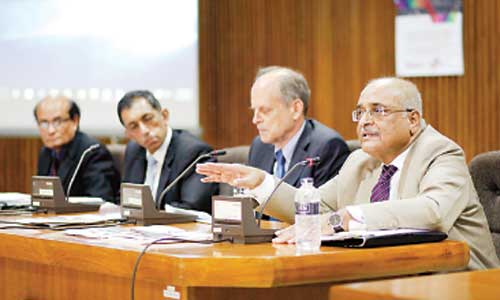ESCAP reports rising inequality amid steady economic growth
Bangladesh has achieved a steady economic growth of more than 6 per cent in the recent years, but the distribution of its benefits has remained unequal with the well-off enjoying the most, economists said on Thursday.
The progress in poverty reduction is slowing down and inequalities are rising, while demographic pressures, an expanding middle class, and rapid urbanisation are posing complex economic, social, environmental and governance challenges in the country, they said in the report launching ceremony of the ‘Economic and Social Survey of Asia and the Pacific 2016’ at IDB Bhaban in the city.
In the study report, the United Nations Economic and Social Commission for Asia and the Pacific said the economic outlook for the developing Asia-Pacific economies is broadly stable but is clouded by uncertainty.
The survey was conducted simultaneously in 24 countries across the Asia-Pacific region. The year-end update on the survey will be released in November 2016.
‘The economic growth of Bangladesh is fine, but the poor may not benefit,’ Debapriya Bhattacharya, distinguished fellow at the Centre for Policy Dialogue, said in the event.
One-third population of Bangladesh is still poor, he said, adding in a country with one-third poor people, what type of economic policy should we think about?
The ESCAP report said the number of poor in the region has not declined in recent years as fast as previously and the benefits of economic growth have increasingly been enjoyed more by the well-off members of the society than the poor.
Debapriya said an expanding middle class has emerged in the country due to rapid urbanisation, which has created a section of higher low-income people in the society.
‘Higher low-income people are the most vulnerable as they have no social protection. They demand a bit higher quality of public services and higher quality of domestic purchasable goods, whereas Bangladesh economy is not responding to them,’ he said.
Market has failed to respond to their demands as investment has not been taking place for certain reasons, Debapriya said.
He said the number of educated unemployed has increased in the country, which is paradoxical, as it is supposed to be the opposite.
‘The education we are getting does not match the demands,’ Debapriya surmised.
According to the ESCAP survey report, the relatively strong economic growth witnessed in the Asia-Pacific region over the last few decades was driven primarily by factor accumulation, that is, by increases in the labour force and the capital stock through investment, including from abroad.
‘ Nevertheless, significant increases in productivity, particularly in labour productivity, also took place throughout the region, such that the gap in the level of labour productivity with developed economies has roughly been halved: labour productivity in the developed economies was about 12 times higher than that in the Asia-Pacific region in 2013 compared with 24 times higher in 1990,’ it said.
To boost productivity, the report recommended a cross-sectoral and integrated approach.
It noted that several countries in the region are deindustrializing too early in their development, by shifting from agriculture-based economies to ones in which services play a dominant role.
According to the report, strengthening the role of agriculture along with rural industrialization is vital not only because agriculture accounts for one in four workers and because 55 per cent of people in the region live in rural areas, but also because greater labour productivity in agriculture would enable higher incomes in the rural sector.
The report said a modest increase in agricultural productivity could lift an additional 110 million people out of poverty by 2030, but that improvements in knowledge and skills will be critical to enable absorption of the large pools of surplus labour that are being released from the rural sector.
The ESCAP projected a 6.8 per cent economic growth in 2016 and a 7 per cent growth in 2017 for Bangladesh.
‘Our projection of economic growth for Bangladesh is near to the government estimation and we think the growth will come from the domestic side,’ said Shuvojit Banerjee, economic affairs officer at UN ESCAP.
He said if any external problems do not take place, the growth would increase a bit.
In a video message, ESCAP executive secretary Shamshad Akhtar “emphasized steady growth in real wages, which is critical for tackling poverty and inequality, as well as supporting domestic demand which also ultimately depends on productivity growth.
She said concerted efforts are needed to revive the region’s economic dynamism and to pursue the 2030 Agenda more effectively.
Such interventions, particularly through fiscal measures, could support not only domestic demand but also strengthen the foundations for productivity-led growth, while fostering real demand through social safety nets and wage increases, Shamshad said.
News Courtesy: www.newagebd.net











